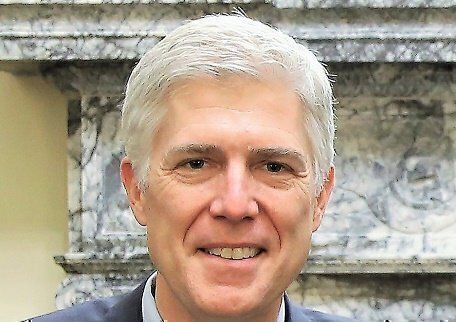Newly minted Supreme Court Justice Neil Gorsuch gets to cast his first private conference vote later this week, and it could help to move a major religious liberty and gay rights case to the Court this fall.
Editor's Note: Gorsuch later decided to not attend the private conference due to preparations for upcoming arguments.
 The now nine-Justice court meets in private conference on Thursday and among the cases it will consider accepting for its next term is Masterpiece Cakeshop, Ltd. v. Colorado Civil Rights Commission.
The now nine-Justice court meets in private conference on Thursday and among the cases it will consider accepting for its next term is Masterpiece Cakeshop, Ltd. v. Colorado Civil Rights Commission.
The case has been distributed for the Justices’ private conference 10 times since September 2016. At least four Justices need to vote in favor of a case sent to the Court for consideration, to move that case to a full set of arguments in public in front of the Justices.
The Masterpiece Cakeshop petition was sent to the Court in July 2016 by attorneys representing Jack Phillips. Phillips and his wife own a business in Colorado, where as a cake artist Phillips designs cakes. Phillips declined to design a cake for a same-sex wedding party on religious grounds.
In state appeals court, the judges sided with the Colorado Rights Commission, agreeing that the business violated the Colorado Anti-Discrimination Act (or CADA) and it ordered the business to create same-sex marriage wedding cakes if it also created other wedding cakes.
Phillips argued that CADA should be interpreted to allow him to refuse to design the cake under the Constitution’s compelled speech and free exercise of religion doctrines. A Colorado Appeals Court disagreed, stating that Phillips’ cake designing was conduct and not free speech, and that the commission’s order didn’t violate the Constitution’s free exercise of religion clause.
The Colorado state supreme court didn’t accept Phillips’ appeal and his attorneys then petitioned the United States Supreme Court.
As a federal Circuit Court judge, Gorsuch has written about similar conflicts. On the federal Circuit Court, Gorsuch wrote an opinion in favor of the religious freedom claims of the family owners of the Hobby Lobby Stores, a retail chain of arts and crafts supplies.
The religiously devout family objected to a requirement under the federal Affordable Care Act that their stores provide birth-control methods for their female employees. A divided Supreme Court later agreed with the U.S. Court of Appeals for the Tenth Circuit that such requirements were unconstitutional.
The internal vote counts at private Supreme Court conferences aren’t publicized. But if the Court accepts the Masterpiece Cakeshop case as soon as next week, there will be talk that Gorsuch had a say in such a decision.
 The now nine-Justice court meets in private conference on Thursday and among the cases it will consider accepting for its next term is Masterpiece Cakeshop, Ltd. v. Colorado Civil Rights Commission.
The now nine-Justice court meets in private conference on Thursday and among the cases it will consider accepting for its next term is Masterpiece Cakeshop, Ltd. v. Colorado Civil Rights Commission.The case has been distributed for the Justices’ private conference 10 times since September 2016. At least four Justices need to vote in favor of a case sent to the Court for consideration, to move that case to a full set of arguments in public in front of the Justices.
The Masterpiece Cakeshop petition was sent to the Court in July 2016 by attorneys representing Jack Phillips. Phillips and his wife own a business in Colorado, where as a cake artist Phillips designs cakes. Phillips declined to design a cake for a same-sex wedding party on religious grounds.
In state appeals court, the judges sided with the Colorado Rights Commission, agreeing that the business violated the Colorado Anti-Discrimination Act (or CADA) and it ordered the business to create same-sex marriage wedding cakes if it also created other wedding cakes.
Phillips argued that CADA should be interpreted to allow him to refuse to design the cake under the Constitution’s compelled speech and free exercise of religion doctrines. A Colorado Appeals Court disagreed, stating that Phillips’ cake designing was conduct and not free speech, and that the commission’s order didn’t violate the Constitution’s free exercise of religion clause.
The Colorado state supreme court didn’t accept Phillips’ appeal and his attorneys then petitioned the United States Supreme Court.
As a federal Circuit Court judge, Gorsuch has written about similar conflicts. On the federal Circuit Court, Gorsuch wrote an opinion in favor of the religious freedom claims of the family owners of the Hobby Lobby Stores, a retail chain of arts and crafts supplies.
The religiously devout family objected to a requirement under the federal Affordable Care Act that their stores provide birth-control methods for their female employees. A divided Supreme Court later agreed with the U.S. Court of Appeals for the Tenth Circuit that such requirements were unconstitutional.
The internal vote counts at private Supreme Court conferences aren’t publicized. But if the Court accepts the Masterpiece Cakeshop case as soon as next week, there will be talk that Gorsuch had a say in such a decision.
Scott Bomboy is editor in chief of the National Constitution Center.
Sign up to receive Constitution Weekly, our email roundup of constitutional news and debate, at bit.ly/constitutionweekly







